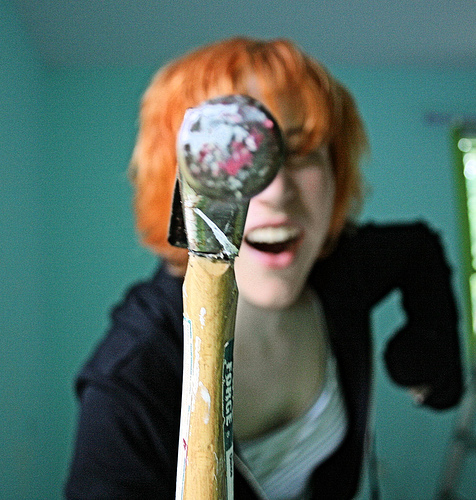Get a Handle on Writer Insecurity
Today’s guest post is by fantasy author Alex Cavanaugh:
We writers tend to be an insecure bunch. We’re plagued with doubts and uncertainties, always questioning our abilities. Sometimes we’re so neurotic, it’s a wonder we accomplish anything!
I didn’t realize how many writers were insecure until I founded the Insecure Writer’s Support Group in 2011. The monthly postings of the three-hundred-odd members showed we were all struggling. Once it expanded to a dedicated website and a Facebook group with more than 2,300 members, it was confirmed. All writers struggle with insecurity.
How do we deal with it? What can we do to keep it from consuming us?
Here are some solutions that might put you back on the path of confidence.
Insecurity isn’t bad—it keeps things real and keeps us grounded
We might dread the insecurity, but a little nagging doubt prompts us to try harder. We’ll spend extra time editing and polishing, determined to make every manuscript shine. It’s when we grow overconfident that we make mistakes. That tug of insecurity also keeps our egos from swelling. Because when we think we are the greatest thing ever, we’re setting unrealistic expectations that will either burn us or prevent us from ever seeing the truth.
Use fear to fuel the fire
When we’re insecure, we understand that we have to do better. We can funnel that fear into motivation and determination. It can become the force that moves us forward, always striving to improve. We’ll try harder. We’ll seek out ways to improve as a writer. That negative energy becomes a positive influence in our lives.
Write something, anything
Nothing is more frightening than a blank screen, unless it’s coupled with a blank mind. We are so full of doubt, we’re paralyzed. What if we’ve run out of ideas? What if we never write again?
That’s when it becomes important to write something, anything, even if it’s just a journal of what we did today. A blog post, article, short exercise using a writing prompt, or even freestyling a stream of consciousness. Whatever works to get us writing.
Study the craft of writing
Insecurity often comes from a lack of knowledge. We’re aware we don’t know the rules. While that’s fine when we first start, as we’re just having fun and writing without inhibition, once we decide to take our writing to the next level, the lack of skill becomes apparent. This is remedied by reading writing books, taking courses, or studying writing craft online. We’ll feel more confident when we know the rules—and when to break them.
Focus on ideas rather than rules
Sometimes we learn so much about the rules that it stops us cold. We worry about breaking the rules—all one million of them—while we’re just trying to get that story idea onto the page. While we don’t want a first draft that’s so messy it can’t be fixed, we don’t want our creativity stifled either. Trust your instinct when it comes to the rules and just write. Let those ideas flow.
Do the research
Worried about the details? Is it the right time frame? Historical facts in order? Scientific data accurate? If you’re unsure, and it’s preventing you from writing, do some research. Do a Google search for the information. Go to the library. Visit the location. Talk to an expert. Again, it’s all about confidence. Be sure of the facts.
Don’t expect perfection
We can edit and revise and polish forever. No matter what we do though, it will never be perfect. Writing is a subjective art form. Perfection to one is utter failure to another. We can’t achieve perfection. We just have to do the best we can.
Break down the big tasks into small ones
Facing a plot that needs extensive outlining? A manuscript that needs a major overhaul? A red pen’s worth of edits? These tasks can be overwhelming. How do we eat an elephant? Well, I wouldn’t suggest we eat one, but we can break that big task into smaller portions. Focus on one aspect at a time. We’ll feel we’re making progress then.
Find support
Our motivation to write and take the steps necessary to succeed must come from within. But when we become discouraged, we need the support of others to carry us through. Whether it’s family, friends, or a writing group, tap into a support network. We need people reminding us that we can do it no matter what.
Find a quality critique partner or two
After reading and editing our manuscripts dozens of times, we sometimes become disenchanted with them. We see all the flaws or can’t find a way to fix the issues. That’s where one trusted critique partner or more can come to our rescue. They can provide valuable feedback and stir fresh ideas in us. And if we choose wisely, we should never fear critique partners. They are there to help us become better writers.
Avoid those who drain
We all have someone in our life who is a negative drain. (Or more, if we’re really lucky!) If it’s our spouse or boss, we’re rather stuck. If not, then it’s up to us to place some distance and step away from that person. We also have to be honest with ourselves. Sometimes that negative influence is a good friend or even a writing group. We have to acknowledge these people do not have our best interests at heart, and either limit connections or sever ties completely.
Take a small step—and then another
We see the big picture–a published book! But there’s so much we need to do to get there. What if we can’t? Yes, we can. Just take the first step. Write the story. Then take the next step. Revise the manuscript. Keep the goal in sight but focus on the next step of the process instead.
Failure is not the end
Another round of suggested edits. Another rejection letter. Another contest lost. Total failure. But it’s not! One failure or setback is not the end. Not if we keep trying.
Sometimes a manuscript just needs a little more work. Sometimes it’s hitting the right publisher. Sometimes it’s all in the timing. But that time won’t come if we think it’s the end and we give up.
Don’t compare
This is when insecurity can really strangle us. We’re not as good as that writer. That writer got a book deal and we didn’t. That author’s books are selling while ours are stagnating.
Nothing reduces our confidence to zero faster than comparisons. We have to remember it’s not a race, and there is no one definition of success. We have to be the best we can be and define success on our own terms.
Recall past praise
Harsh critiques, rejections, bad reviews—all those can knock our confidence for a loop. Rather than wallow in the negative and our own self-pity, why not draw upon past praise and accomplishments? We tend to focus on the negative, when in fact there’s always more positive. Go back and find it.
Understand what we can’t control
We can write the best book possible. We can contact all the right publishers and agents. We can market the heck out of our book. But outside of that, most of it we can’t control. We have to let the other stuff go. Worrying about it won’t change it. We have to focus on things within our control and do our best to improve.
Leave it to a higher power
Sometimes, we just have to go on faith. We’ve done all we can. Now’s the time to leave it to a higher power.
Insecurity will always plague us. We just have to learn to harness and control it. And then, anything is possible!
 Alex J. Cavanaugh is an author and also works in web design, graphics, and technical editing. A fan of all things science fiction, his interests range from books and movies to music and games. Online, he is the Ninja Captain and founder of the Insecure Writer’s Support Group. He’s the author of Amazon bestsellers CassaStar, CassaFire, and CassaStorm. Check out his new release Dragon of the Stars. Visit Alex’s blog here and follow him on Twitter.
Alex J. Cavanaugh is an author and also works in web design, graphics, and technical editing. A fan of all things science fiction, his interests range from books and movies to music and games. Online, he is the Ninja Captain and founder of the Insecure Writer’s Support Group. He’s the author of Amazon bestsellers CassaStar, CassaFire, and CassaStorm. Check out his new release Dragon of the Stars. Visit Alex’s blog here and follow him on Twitter.
Feature Photo Credit: TataVarisara via Compfight cc












Thanks again!!
Such great tips. I especially like the one of recalling past praise. It’s storing up confidence for a time when we need it most…helpful if we copy/paste good reviews into a document to read later.
Wise words, Alex. Brilliant post. 🙂
I struggle with finding (and retaining) good CP’s and BR’s, with staying focussed on one aspect at a time, and with making ridiculous comparison, etc. But I help myself by studying the craft (all the time), writing (all the time), and trying not to take negative feedback too personally, because like you say, it’s a subjective craft. 🙂
shahwharton.com
It is indeed subjective.
The big problem I have been having is finding a quality critique partner. Does it necessarily have to be someone nearby (same area of town, same town)?
My critique partners are spread across the globe. One’s even in Australia.
Great points. I like the one about realizing there are things you can’t control. Writers need to keep this in mind when they set goals or they may be destined to never reach them. You can’t set a goal to be a bestseller because that is largely out of your control.
And finding others for support, well there is this group founded by this guy and it posts the first Wednesday…
Who is that guy…?
So much is out of our control.
What a helpful and informative post, Alex and C.S. I think that the biggest misconception non-writers have about writers is that the ideas just flow perfectly out of a writer’s pen or keyboard. Haha! Have a great week!
Wish they did flow!
Great post. It certainly needs saying – a lot! Thanks, Alex, for taking the time. I’ll look at the website.
Linda, we had to switch web hosting services, so the IWSG link is temporarily http://insecurewriterssupportgroup.blogspot.com/
Thanks, Alex.
Just what I needed to read today. Thank you for it.
Excellent tips, Alex. You should make a mini poster of them; we can post them in our writing spaces. 🙂
Karen, I’ll do that!
Those are some great points, Alex. I often use, sit and write anything. It’s amazing what comes to mind and on the page. I really like focusing on ideas rather than rules. The rules–which make you think you have to write perfectly the first try–can trap you and keep you from writing. No one is perfect the first try. Even Bestsellers.
Sia McKye Over Coffee
Sia, I’m a perfectionist, so I really have to watch for that one.
I’m mostly insecure about what comes after the book has been written. I’ve learned a lot about self-publishing, but it still feels like there’s so much out there I don’t know. I’m afraid of doing something wrong out of ignorance. I keep learning, though, and moving forward. Sending my book out into the world was one huge leap of faith for me. There’s no going back now.
Yes, I’m another one of them. I know I can write well, like a lot of writers, and yet I suffer from terrible insecurity in regard to my writing. Great post. Thanks
Lori, fortunately there are a lot of authors who’ve gone down that road who you can ask for advice.
Add me to the ranks of insecure writers! Thanks for the post.
Good advice, especially after getting a less-than-glowing review from a family member. Oh well. You really can’t please everyone.
Tamara, that’s harsh.
Excellent tips. Thank you so much for creating IWSG. It’s made such a huge difference in my life.
Joylene, that’s good to hear!
Studying the craft is so important. Luckily reading amazing books is one way to do that.
Great reminder list for the bulletin board!
Each one of them plagues us at some time or another during the process.
Really great tips, Alex! Research can be a procrastination tool for me 🙂
Many days I also battle with insecurity as a writer, often times I feel I have failed myself. These are great tips to follow and use on the days we as writers are feeling our writing isn’t good enough. My favorite tip is remembering past praise. Often times we could hear a hundred amazing reviews about ironwork but the one negative comment can leave us ready to quick. Reading through or remembering all the great comments we’ve heard can really help to boost confidence.
Elizabeth, it does help to go back and read the good reviews.
Excellent tips, Alex. Keeping distance from negative people is difficult, indeed, when they happen to be family members. I think the best advice you’ve given, for me, is to remember to break daunting tasks down into smaller ones. I am often overwhelmed when I realize how much work I need to accomplish and it is so frustrating. There have been many times when the project seems so impossible that I put it off and nothing good comes from that.